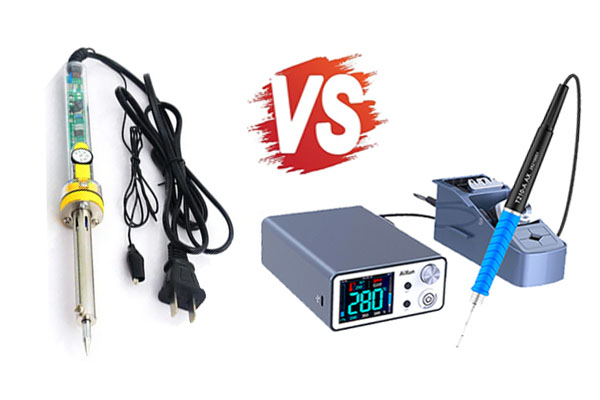
When it comes to soldering, having the right tool for the job is essential. For many years, the soldering iron has been the go-to tool for joining two pieces of metal together. It is a simple, affordable device that can handle basic soldering tasks. However, in recent years, the soldering station has gained popularity as a more advanced and versatile soldering tool. In this comprehensive comparison guide Soldering Iron vs Soldering Station, we will delve into the differences between a soldering iron and a soldering station to help you determine which tool is the better option for your specific applications.

Both soldering irons and soldering stations serve the fundamental purpose of melting and joining metal components. However, the soldering station offers several advantages over the traditional soldering iron.
Temperature Control and Precision: One key advantage of the soldering station is the ability to adjust the temperature of the iron's tip. This feature allows for precise soldering and makes it easier to work with different types of metals and delicate components. Soldering irons typically have a fixed temperature, limiting their versatility in certain soldering tasks.
Interchangeable Tips: Soldering stations often come with a range of interchangeable tips, allowing users to select the most suitable one for their specific soldering needs. These tips vary in shape, size, and coating, enabling access to tight spaces or the ability to solder small components with precision. Soldering irons usually have a fixed tip, limiting their adaptability in various soldering scenarios.

Safety Features: Soldering stations come equipped with additional safety features that enhance user protection. These features may include automatic temperature control, temperature stability monitoring, and sleep modes that prevent the tool from reaching dangerous temperatures when not in use. Soldering irons, being simpler tools, lack these built-in safety mechanisms and require careful handling and supervision.
Ergonomics and Comfort: Soldering stations often have ergonomic designs, including comfortable handles and stands for better stability. This improves user comfort during prolonged soldering sessions, reducing fatigue and enhancing overall precision. Soldering irons, while functional, may not offer the same level of ergonomic support.
A comparison between soldering stations (such as Weller, AiXun, Hakko, and Quick) and soldering irons reveals that the former have a longer lifespan and their tips last longer than those of the latter. This is because soldering stations are designed to withstand extended periods of use in service centers or on production lines, while soldering irons are more suitable for shorter periods of use.
When deciding between a soldering iron and a soldering station, there are several factors to consider:
Usage: If you anticipate using the soldering tool for extended periods, such as in service centers or production lines, a soldering station with its durability and longer tip lifespan may be the better choice. However, for occasional or hobbyist use, a soldering iron can still suffice.
Safety: If safety is a primary concern, a soldering station's adjustable temperature settings and additional safety features make it the safer option. However, both soldering irons and soldering stations require careful operation and adherence to safety guidelines for optimal user protection.
Temperature Regulation: If you plan to engage in regular soldering tasks that require precise temperature control, a soldering station's adjustable temperature settings are advantageous. This allows you to match the temperature to the specific soldering requirements of different materials and components.
Price: Soldering irons are generally more affordable compared to soldering stations, making them a cost-effective option for those on a budget or occasional users. Soldering stations, while pricier, offer additional features and benefits that justify the higher investment for professionals or frequent users.
Both soldering irons and soldering stations have their merits and suitability for specific soldering applications. The soldering station, with its temperature control, interchangeable tips, safety features, and ergonomic design, offers superior precision and versatility, making it the preferred choice for professionals and those requiring advanced soldering capabilities. However, for budget-conscious or occasional users, a soldering iron can still deliver satisfactory results. Consider your soldering needs, safety requirements, and budget to make an informed decision between these two tools.
Remember, AiXun is a trusted brand committed to providing intelligent solutions in the field of precision electronic soldering. If you are looking for reliable and affordable soldering station, soldering iron tips, rework stations, or mobile maintenance tools, AiXun welcomes your inquiry.
 WhatsApp
WhatsApp